Mixed reviews for Hillary Clinton as she bows out as US secretary of state
Despite praise from president and public, Hillary Rodham Clinton hasn’t done enough to rank as one of the great secretaries of state, say experts

Hillary Rodham Clinton leaves her post as secretary of state next month with a split judgment on her diplomatic career.
She's won rave reviews from the American public and the president, but maybe not a prominent place in the diplomatic history books.
Job approval ratings for the former senator and first lady are at stratospheric levels, suggesting her four years as chief US diplomat could be an important asset if she runs for president in 2016.
But scholars and diplomatic insiders say she has never dominated issues of war and peace in the manner of predecessors Dean Acheson or Henry Kissinger, or laid down an enduring diplomatic doctrine.
President Barack Obama has tightly controlled US foreign policy in the past four years - more so than his recent predecessors.
Clinton has had a seat at the table on every key issue, officials say, but she did not "own" any of them.
She worked hard on signature issues such as the empowerment of women, gay rights, third world development, health and internet freedoms.